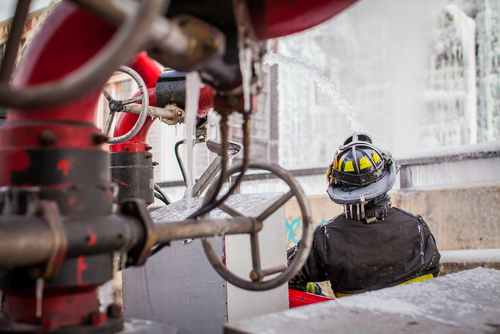
While firefighting in winter might provide some much-needed cool relief in some regards, these professionals face additional demands during the cold season. With snowfall, ice, and extreme weather conditions, firefighters must understand and prepare their crews for such harsh circumstances. In addition to protecting your clients with a Firefighter General Liability Insurance program, share the following with them to ensure they have a safe winter season in the field.
Response safety.
Preparing for winter response starts with making certain that our apparatus is ready and in top operating condition (as it should be at all times). In particular, driver/operators should make certain that they are familiar with the operations of window defrosters, heat vents and brake retarders on their particular apparatus as well as their department’s guidelines for operating a “dry” versus “wet” pump during winter months. Further, coating the threads of any fittings or port caps with straight antifreeze will help to prevent them from freezing without damaging any gaskets and should performed as needed in daily vehicle checks, states Firehouse. Next, drivers should give themselves plenty of stopping room to accommodate icy roads and allow for a little more time when responding to calls to ensure the crew arrives safely.
On-scene concerns.
The company officer will have to determine if the equipment is reachable or if they are blocked by snowbanks. If so, the tactical strategy will have to be adjusted on site to accommodate this. In addition, finding fire hydrants that are not submerged under snow is the next hurdle. If they are frozen, small handheld propane torches can be of great use to free frozen hydrant caps or hose couplings during cold weather and should be placed on the rig for winter months, explains the article.
Once it is flowing, the water must be kept moving to prevent it from freezing again. Further, Firehouse explains that if water is constricted as in a hoseline or piping when this expansion of mass takes place, the pressure exerted can cause costly damage. For this reason, keep nozzles, deck guns, ladder pipes, and similar equipment partially open with water flowing until ready to shut down and pack up. Hoselines and ladder pipes should be drained and picked up immediately when they stop flowing water and are no longer needed.
Slips and falls.
With ice on the ground, firefighters’ boots can lose their gripping. To prevent this, consider using spikes that slip over boot soles while working in icy and snowy conditions.
About Provident Fire Plus
At Provident Fire Plus, we offer custom tailored packages to best protect firefighters. We understand the risks that emergency response teams are subjected to on a daily basis, and have worked to serve these dedicated professionals for over 87 years. For more information about our products and policies, we invite you to contact our experts today at (855) 201-8880.

